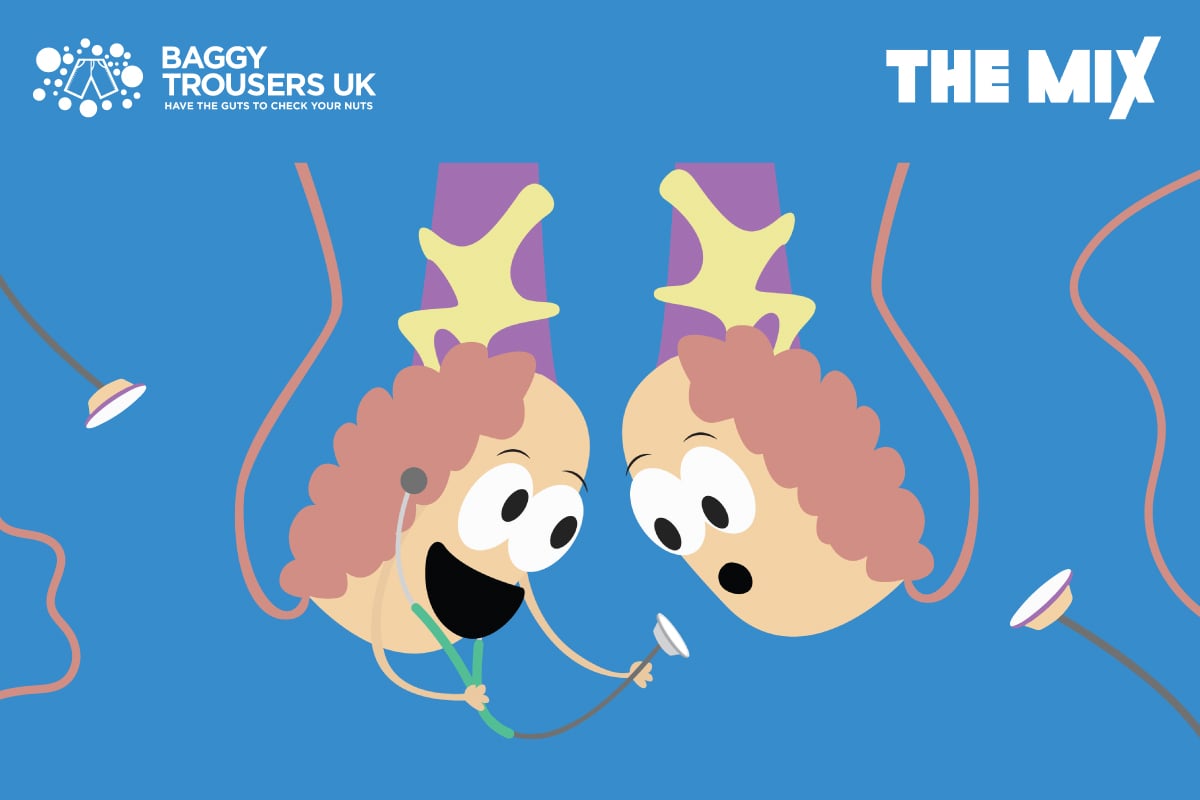How to check your testicles
We’ve teamed up with testicular cancer charity, Baggy Trousers UK, to bring you a step-by-step self-examination guide for how to check your balls. That’s right, it’s time to get up close and personal!

Why should I check my testicles?
Learning how to check your testicles can be helpful for a few reasons:
- It can help you to learn how your testicles usually feel and look.
- You’re more likely to notice small/subtle changes like an infection or a cyst.
- You could detect the signs of testicular cancer, and get it treated early, therefore reducing the risk of a delayed diagnosis.
How to check your balls
Step 1:
The best time to check is when your skin is relaxed, so run yourself a warm bath or jump in the shower.
Step 2:
It’s best to examine one testicle at a time. Hold the testicle between your thumb and first two fingers and roll with gentle, consistent pressure. Check for any changes in shape and size, any lumps or anything different you notice. Get to know your epididymis (sperm cord), which should feel rope like and can be tender to pressure; both these things are normal.
Step 3:
It can feel worrying if you notice a lump or something that’s changed, but there’s no need to panic. It’s likely that it will be something like a cyst or benign (non-cancerous), but if you do notice anything unusual or anything that worries you, book an appointment with your doctor as soon as possible. If the signs of testicular cancer are caught early enough, it is highly curable.
Remember: Most men and people with testicles will have one that is bigger than the other, or you might find that one of your balls hangs a bit lower than the other (or both of these). This is very normal and there’s no reason to worry about it. Take a look at our article about testicles here.
What is testicular cancer?
Testicular cancers are known scientifically as germ cell tumours. Germ cells are the cells that produce sperm, which is why you can get germ cell tumours in your balls. There are lots of different forms of testicular cancers and you can find out more about them via Cancer Research UK.
What are the signs of testicular cancer?
Signs of testicular cancer can include swelling, a lump, or a heavy feeling in your testicles.
What happens if I get a testicular cancer diagnosis?
Getting a diagnosis of any kind of cancer can feel worrying and overwhelming. If you have recently had a testicular cancer diagnosis, know that you’re not alone and that it’s completely normal to feel anxious.
The good news is that advances in testicular cancer treatment mean that testicular cancers are among the most treatable forms of cancer and have very high survival rates, especially when caught early.
How can I get support if I’ve been diagnosed with testicular cancer?
If you’ve had a testicular cancer diagnosis recently, then there are lots of places you can find support.
How can I open up about my diagnosis?
You may not feel like talking about your diagnosis or your treatment, and that’s understandable, but it’s likely you’ll feel so much better if you share what’s going on with the people in your life. You might worry that you’ll be judged for showing that you’re worried or scared, but it’s likely that your friends and family will just want to help.
If you don’t feel comfortable talking about it in person, you could send a text, or suggest going for a walk or a drive and have the conversation then so it feels less intense. Writing down how you’re feeling can really help as well. Read our guide to opening up about your mental health here.
Expert support
You can get in touch with the experts at Baggy Trousers UK by calling 0800 772 3910 or email [email protected], or you can fill in the contact form on the contact page here. They are there to help you through this process and understand that there are many ways to deal with it.
Jack is the founder of Baggy Trousers UK – he experienced testicular cancer at the age of 21 which led him to setting up the charity to raise awareness and provide support to those impacted by testicular cancer. Baggy Trousers UK has a team of people who’ve all experienced testicular cancer and provide peer support, therapy sessions and online support..
Other support options
You can get in touch with the team at The Mix to talk through what’s going on for you through our free and confidential services. You can find support through other young people who are going through the same thing you are via The Mix’s peer support community.
Head to this ITV article to read the stories and watch the interviews of those who have gone through a testicular cancer diagnosis and treatment.
Next Steps
- Chat about this subject on our Discussion Boards.
By Holly Turner
Updated on 16-Nov-2022
Sorry, comments closed
No featured article













